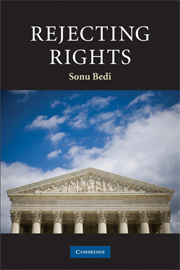Book contents
2 - Reflexive rights: jeopardizing freedom, equality, and democratic debate
Published online by Cambridge University Press: 01 July 2009
Summary
The classic characterization of rights fails to take seriously the value of democracy. The republican alternative threatens liberty. How, then, should we limit government? How do we balance the need for democratic decision-making without falling prey to such tyranny? The reigning answer seems to be a reflexive conception of rights. It recognizes the “democratic deficit” inherent in the classic characterization of rights. It offers in its place a dynamic and active counterpart where rights are (re)validated and (re)defined by the democratic majority.
Frank Michelman, for instance, recognizes that American constitutional jurisprudence has commitments to both “self-rule” (to be governed by the people) and “law-rule” (to be governed by the law). Adapting Robert Cover's term of “jurisgenerative,” Michelman articulates a “jurisgenerative politics” where the aim of reconciling these two commitments stands at the core of constitutionalism. That is, we are both the “subject” and the “author” of the laws. Not only do we follow the law but also have a hand in articulating and re-articulating it. Holding on to rights, the reflexive account would have democracy inform and define those interests or areas of the subject where the state ought not to interfere. The reflexive approach aims to democratize rights, democratize the conventional account of limited government. It aims to offer democracy a necessary role.
Seyla Benhabib describes her project as one of “democratic iteration.” It emphasizes the reflexive and debatable character of rights. Rights claims and principles must be “contested and contextualized, invoked and revoked, posited and positioned.”
- Type
- Chapter
- Information
- Rejecting Rights , pp. 24 - 38Publisher: Cambridge University PressPrint publication year: 2009



